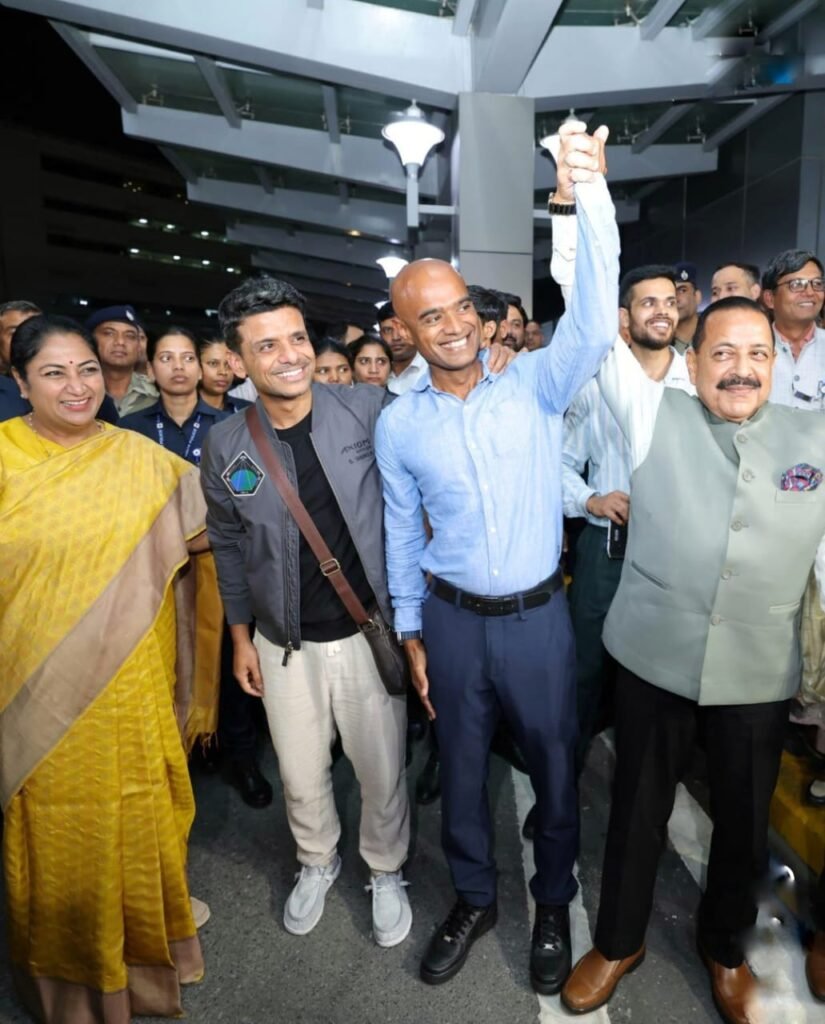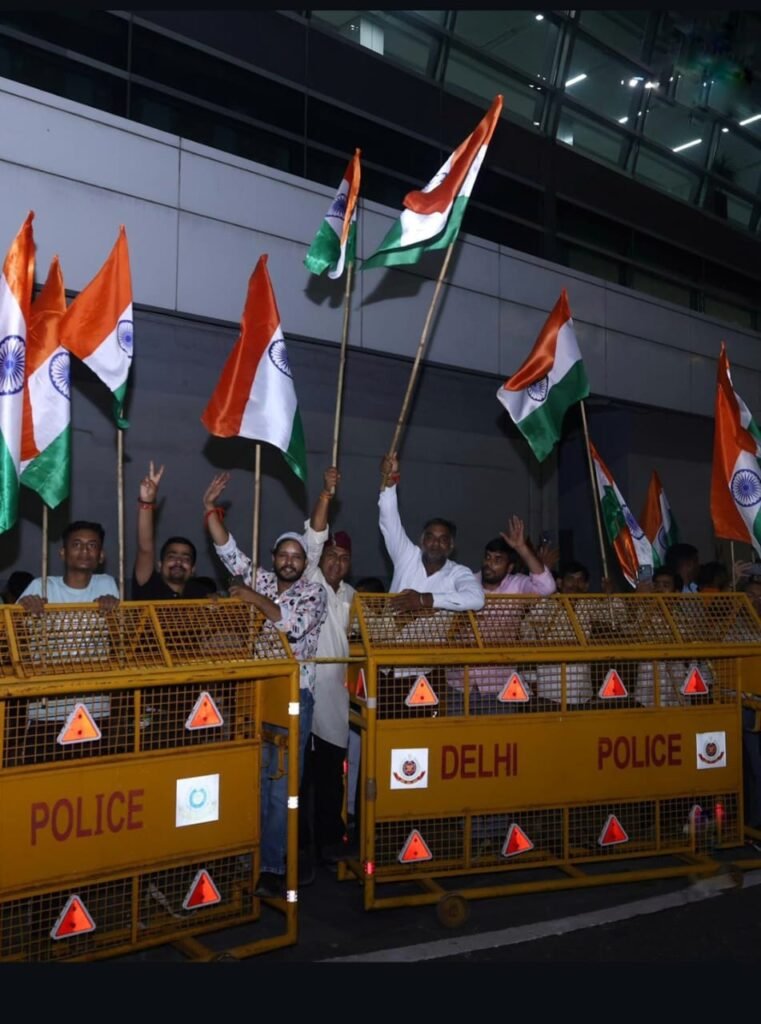India’s space journey has reached a new pinnacle with the triumphant return of Group Captain Shubhanshu Shukla. After a historic mission to the International Space Station (ISS) as part of the Axiom-4 crew, Shukla received a hero’s welcome, underscoring the nation’s growing pride and ambition in space exploration. His return marks a significant moment, not only for the Indian Space Research Organisation (ISRO) but for the entire country, which is now looking toward a future of self-reliance and global leadership in space.
Following his successful 18-day mission, Group Captain Shubhanshu Shukla, who piloted the spacecraft, was met with a red-carpet welcome at Delhi’s IGI airport. The early morning reception was a testament to his historic achievement, with Union Space Minister Jitendra Singh, Delhi Chief Minister Rekha Gupta, and ISRO Chairman V. Narayanan personally greeting him. The enthusiastic crowd of space enthusiasts further highlighted the widespread public interest in India’s space program. Minister Jitendra Singh’s post on X captured the sentiment of a nation filled with pride, calling it a “moment of glory for #ISRO” and a “moment of pride for India.”
Shukla’s homecoming was a poignant moment, shared with fellow Gaganyaan astronaut Group Captain Prasanth Balakrishnan Nair, who served as his backup. Their return together symbolized the collective effort and dedication behind India’s ambitious space endeavours.
The celebrations continued as Group Captain Shukla was scheduled to meet Prime Minister Narendra Modi. The meeting, which took place at the Prime Minister’s residence, was an opportunity for Shukla to share his firsthand experiences from space. In a candid interaction, he revealed one of the biggest challenges on the ISS: food. “Food is a big challenge on a space station,” he explained, citing the constraints of space and the high cost of cargo. He also spoke of the overwhelming global recognition of India’s space program, noting that people he met around the world were “more excited about Gaganyaan” than he was.
During the meeting, Shukla presented the Prime Minister with the Axiom-4 mission patch and the Indian tricolour he had carried to space, the same flag that had been visible during their virtual interaction from the ISS. Prime Minister Modi’s post on X described the interaction as a “proud moment,” where they discussed a wide range of subjects, including Shukla’s experiences, progress in science and technology, and the future of the Gaganyaan mission.

Group Captain Shubhanshu Shukla’s mission was historic for multiple reasons. He became the second Indian to journey to space, four decades after Wing Commander Rakesh Sharma’s 1984 mission. More significantly, he was the first Indian to set foot on the International Space Station. Aboard the ISS, Shukla and his crew members—Peggy Whitson (US), Slawosz Uznanski-Wisniewski (Poland), and Tibor Kapu (Hungary)—conducted over 60 experiments and 20 outreach sessions, contributing valuable scientific data to the global space community.
As India Celebrates New Space Hero: Astronaut Shubhanshu Shukla’s Historic Return from the ISS. This mission served as a crucial stepping stone for India’s own indigenous human spaceflight program, Gaganyaan. Prime Minister Modi, in his Independence Day speech, highlighted that Shukla’s mission was part of India’s efforts to become “self-reliant in the space sector” and prepare for Gaganyaan. Shukla’s personal documentation of his mission, as advised by the Prime Minister, will be instrumental in the training and preparation for the upcoming Gaganyaan astronauts.
The return of Group Captain Shubhanshu Shukla has ignited a national conversation about India’s future in space. A special discussion in the Lok Sabha on “India’s first astronaut aboard the ISS — critical role of space programme for Viksit Bharat by 2047” highlights the mission’s importance in the context of national development. The government and opposition have united in celebrating this achievement, underscoring its significance beyond politics.
With the successful Axiom-4 mission and the ongoing preparations for Gaganyaan and India’s own space station, the country is well on its way to cementing its position as a global leader in space exploration. Group Captain Shubhanshu Shukla’s historic journey is not just a personal triumph but a powerful symbol of India’s ambition, innovation, and determination to reach for the stars.
The return of Group Captain Shubhanshu Shukla from his historic mission to the International Space Station is more than just the end of a successful spaceflight; it is the powerful beginning of a new chapter in India’s space history. His red-carpet welcome and subsequent meeting with Prime Minister Narendra Modi underscore a profound shift in the national consciousness—a growing realization that space exploration is not merely a scientific pursuit but a critical component of national pride, technological advancement, and global influence. Shukla’s journey has served as a unifying moment, bringing together political leaders and citizens alike in a shared celebration of human achievement and national ambition.
Shukla’s detailed account of his experiences—from the technical challenges of piloting the spacecraft to the personal reflections on life in space and the global recognition of India’s space program—provides invaluable insights for the future. His emphasis on the “big challenge” of food on the space station, for instance, highlights the practical, real-world problems that India’s space program will need to solve as it prepares to sustain its own astronauts in space for longer durations. More importantly, his observation that the international community is eagerly watching and cheering for the Gaganyaan mission is a testament to India’s burgeoning reputation as a serious and capable space power. This newfound international respect is a powerful motivator, demonstrating that India’s space ambitions are not just for its own benefit but are also contributing to the collective human endeavour of exploring the cosmos.

Looking ahead, the road to “Viksit Bharat by 2047” is inextricably linked to the trajectory of India’s space program. The special discussion held in the Lok Sabha on Shukla’s mission signals a high-level commitment to this vision. The successful Axiom-4 missions, and the invaluable experience gained by Group Captain Shukla, will directly inform and accelerate the development of the Gaganyaan program, paving the way for India’s first indigenous human spaceflight. Beyond Gaganyaan, the ultimate goal of establishing an Indian space station looms on the horizon, promising to transform India from a participant in global space efforts to a leader. Shubhanshu Shukla’s historic journey has not only provided the nation with a new hero to inspire generations but has also laid a crucial foundational stone for a future where India’s presence in space is not an exception, but the norm. His safe return is a beacon of hope and a promise of the great things yet to come for India in the final frontier.
